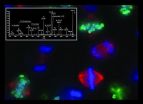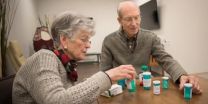(Press-News.org) BOSTON – It's by now well established that obesity is a major risk factor for diabetes. But what exactly is it about extra body fat that leads to insulin resistance and blood glucose elevation, the hallmarks of diabetes?
Over the past several years, Beth Israel Deaconess Medical Center (BIDMC) endocrinologist Barbara Kahn, MD, has developed a large body of research suggesting that a molecule called retinol binding protein 4 (RBP4) plays a key role in the process. Kahn's lab was the first to show that elevated levels of RBP4 – previously known only for its role as a transport protein for Vitamin A – led to the development of insulin resistance in animal models. Additional work revealed parallel results in human blood samples: obese, insulin-resistant individuals had high RBP4 levels and lean, insulin-sensitive people had low RBP4 levels. Furthermore, people with genetic changes in RBP4 that resulted in high blood levels of the protein had an elevated risk of developing diabetes.
Now, Kahn and her colleagues explain the mechanism by which RBP4 contributes to increased risk of diabetes. In a study that appears online in the March 4 issue of the journal Cell Metabolism, the investigators describe how the protein sets in motion a complex interplay between two branches of the body's immune system, leading to chronic fat tissue inflammation and, ultimately, insulin resistance.
"Although the inflammatory response is a key part of our immune system and an important means of protection and tissue repair in response to infection or injury, under certain conditions of metabolic dysfunction, this response is activated even in the absence of foreign pathogens," explains Kahn, Vice Chair of the Department of Medicine at BIDMC and George Richards Minot Professor of Medicine at Harvard Medical School. "It seems that in the case of obesity, RBP4 is acting like a foreign pathogen and provoking the immune system."
As a result, she explains, the immune cells in fat tissue become activated and produce inflammatory signals that the body usually reserves to repair tissue that is damaged or infected. This chronic inflammation then creates an environment that leads to insulin resistance, a state in which the body is unable to properly respond to insulin, the hormone that transports sugar from the blood into cells to be used for energy production and fuel storage.
Previous work in the Kahn lab had shown that elevated levels of RBP4 were causing inflammation of immune cells in cell cultures. In this new paper, a team led by first author Pedro M. Moraes-Vieira, PhD, set out to determine if this was happening in vivo and utilized a mouse model that that was genetically engineered to have high levels of RBP4.
"Certain immune cells called CD4 T cells play a key role in the body's adaptive immune system, which regulates the immune response against foreign invaders following infection or injury, as well as in autoimmune diseases that result from self-antigens," explains Moraes-Vieira. Unlike the innate immune system, which is made up of cells and proteins that are always present and ready to respond against attacking microbes, the adaptive system is normally silent and is only called to action to turn up the immune response if pathogens evade or overcome innate immune defenses.
"The magnitude of the body's immune response is determined by the number and availability of specific receptors which are present on two types of antigen presenting cells – macrophages and dendritic cells," explains Moraes-Vieira. "These belong to the innate immune system. But when either of these antigen presenting cells is exposed to foreign invaders, they, in turn, become activated and go on to trigger the CD4 T cells of the adaptive immune system."
Through a series of animal experiments, the authors discovered that high levels of RBP4 – similar to what would be found in obese or insulin-resistant humans –was the "foreign invader" that was providing the trigger for activation of the antigen-presenting cells, which then caused CD4 T cells to spring into action.
"When we took normal immune cells from normal animals, treated them with RBP4 outside the body, and then put those cells back into the normal animals, the mice became insulin resistant with widespread inflammation in fat tissue," says Kahn.
"The idea that the effect of this particular circulating molecule on immune cells can lead to metabolic syndrome [insulin resistance with associated cardiovascular risk factors, such as hypertension and elevated levels of LDL cholesterol] suggests that we could develop drugs that would result in decreased RBP4-induced inflammation, improved insulin sensitivity and reduced risk of metabolic disease," she adds. "This is an important discovery as the prevalence of obesity and diabetes continues to dramatically increase worldwide, and actually threatens to shorten our lifespans."
INFORMATION:
In addition to Kahn and Moraes-Vieira, coauthors include BIDMC investigators Mark M. Yore, Peter M. Dwyer, Ismail Syed and Pratik Aryal.
This work was supported by National Institutes of Health grants R37 DK 43051; P30 DK57521; 5T32DK07516-29, as well as grants from the Harvard Training Program in Nutrition and Metabolism and the JPB Foundation.
Beth Israel Deaconess Medical Center is a patient care, teaching and research affiliate of Harvard Medical School, and currently ranks third in National Institutes of Health funding among independent hospitals nationwide.
The BIDMC health care team includes Beth Israel Deaconess Hospital-Milton, Beth Israel Deaconess Hospital-Needham, Beth Israel Deaconess Hospital-Plymouth, Anna Jaques Hospital, Cambridge Health Alliance, Lawrence General Hospital, Signature Health Care, Commonwealth Hematology-Oncology, Beth Israel Deaconess HealthCare, Community Care Alliance, and Atrius Health. BIDMC is also clinically affiliated with the Joslin Diabetes Center and Hebrew Senior Life and is a research partner of Dana-Farber/Harvard Cancer Center. BIDMC is the official hospital of the Boston Red Sox. For more information, visit http://www.bidmc.org.
Researchers identify a critical link between obesity and diabetes
Working via the immune system, the RBP4 molecule leads to inflammation of fat tissue and increased risk of diabetes
2014-03-06
ELSE PRESS RELEASES FROM THIS DATE:
Strategies on the Internet to discredit generic drugs
2014-03-06
Although there is widespread consensus among the scientific community that the composition of generic drugs is identical to that of brand name drugs, this is not the case among the public. In a four-year study of over 3,000 opinions on Spanish web pages, researchers at the National University of Distance Education (UNED) of Spain have identified communication strategies aimed at creating risk perceptions about generic drugs, which may influence the low usage of these drugs.
Generic drugs, which are copies of brand name drugs whose patent has expired, have exactly the ...
New research could help make 'roll-up' digital screens a reality for all
2014-03-06
Researchers from the University of Surrey worked together with scientists from Philips to further develop the 'Source-Gated-Transistor' (SGT) - a simple circuit component invented jointly by the teams.
Previously, they found that the component could be applied to many electronic designs of an analog nature, such as display screens. Through this current study, researchers have now shown that SGTs can also be applied to next-generation digital circuits.
SGTs control the electric current as it enters a semiconductor, which decreases the odds of circuit malfunction, improves ...
Researchers capture 'most complete' picture of gene expression in cancer cell cycle
2014-03-06
Uncontrolled cell growth and division is a hallmark of cancer. Now a research project led by the University of Dundee has provided the most complete description to date of the gene activity which takes place as human cells divide.
Researchers have managed to gather data which details the behaviour of protein molecules encoded by over 6000 genes in cancer cells, as they move through the cell cycle. The team has used advances in technology and data analysis to study how genes work over time in cancer cells, as opposed to capturing a `snapshot' of activity – a leap forward ...
Sudden cardiac death: Genetic disease ARVC more common than hitherto assumed
2014-03-06
The genetic disease ARVC leads to sudden cardiac death and is more common than it has been hitherto assumed. This is reported by an international team of researchers headed by Prof Dr Hendrik Milting from the Heart and Diabetes Center NRW in the "European Heart Journal". The molecular biologist working at the Ruhr-Universität's clinic in Bad Oeynhausen revealed that all families who are known to be affected by the disease share the same genetic origin. There must be other families in Europe who also carry the genetic mutation but who are not yet known.
Mutation initially ...
Study suggests higher levels of omega-3 in diet are associated with better sleep
2014-03-06
A randomised placebo-controlled study by the University of Oxford suggests that higher levels of omega-3 DHA, the group of long-chain fatty acids found in algae and seafood, are associated with better sleep. The researchers explored whether 16 weeks of daily 600 mg supplements of algal sources would improve the sleep of 362 children. The children who took part in the study were not selected for sleep problems, but were all struggling readers at a mainstream primary school. At the outset, the parents filled in a child sleep questionnaire, which revealed that four in ten ...
When art and science collide -- the masterpiece unmasked
2014-03-06
This news release is available in French. Gallery owners, private collectors, conservators, museums and art dealers face many problems in protecting and evaluating their collections such as determining origin, authenticity and discovery of forgery, as well as conservation issues. Today these problems are more accurately addressed through the application of modern, non-destructive, "hi-tech" techniques.
Dmitry Gavrilov, a PhD student in the Department of Physics at the University of Windsor (Windsor, Canada), along with Dr. Roman Gr. Maev, the Department of Physics ...
Half the survivors in 1 Japanese town have PTSD symptoms
2014-03-06
Though just two of Hirono's 5,418 residents lost their lives in Japan's mega-earthquake and tsunami, a new study shows that the survivors are struggling to keep their sanity.
One year after the quake, Brigham Young University professor Niwako Yamawaki and scholars from Saga University evaluated the mental health of 241 Hirono citizens. More than half of the people evaluated experienced "clinically concerning" symptoms of post-traumatic stress disorder. Two-thirds of the sample reported symptoms of depression.
Those rates exceed levels seen in the aftermath of other ...
Heart failure unknowns a roadblock to managing health
2014-03-06
Al Brommeland found a true partner in his wife Florence. Through 57 years of marriage they've proved a formidable team, swinging and bowing at square dances, kicking up dust in their clogs, and now in their golden years, taking daily strolls side by side.
When Al started experiencing irregular heart rhythm 12 years ago, the couple worked together to stay healthy. It hasn't been easy, both in terms of symptoms—emergency doctors stopped and restarted Al's heart eight times over the years—or finding answers to their questions about how to best manage his illness, recently ...
UCLA engineering team increases power efficiency for future computer processors
2014-03-06
Have you ever wondered why your laptop or smartphone feels warm when you're using it? That heat is a byproduct of the microprocessors in your device using electric current to power computer processing functions — and it is actually wasted energy.
Now, a team led by researchers from the UCLA Henry Samueli School of Engineering and Applied Science has made major improvements in computer processing using an emerging class of magnetic materials called "multiferroics," and these advances could make future devices far more energy-efficient than current technologies. ...
LSUHSC mental health care model reduced symptoms in those most affected by BP oil spill
2014-03-06
New Orleans, LA – A model of care developed by the Department of Psychiatry at LSU Health Sciences Center New Orleans School of Medicine to provide mental health services after the Deepwater Horizon Gulf Oil Spill reduced both mental health and general medical symptoms. The novel approach embedded psychiatrists, psychologists, social workers and telemedicine resources into primary care clinics in the most affected areas. This new model can be used in communities at risk for disasters and rural communities with limited mental health resources. The initiative is featured ...
LAST 30 PRESS RELEASES:
Transient Pauli blocking for broadband ultrafast optical switching
Political polarization can spur CO2 emissions, stymie climate action
Researchers develop new strategy for improving inverted perovskite solar cells
Yes! The role of YAP and CTGF as potential therapeutic targets for preventing severe liver disease
Pancreatic cancer may begin hiding from the immune system earlier than we thought
Robotic wing inspired by nature delivers leap in underwater stability
A clinical reveals that aniridia causes a progressive loss of corneal sensitivity
Fossil amber reveals the secret lives of Cretaceous ants
Predicting extreme rainfall through novel spatial modeling
The Lancet: First-ever in-utero stem cell therapy for fetal spina bifida repair is safe, study finds
Nanoplastics can interact with Salmonella to affect food safety, study shows
Eric Moore, M.D., elected to Mayo Clinic Board of Trustees
NYU named “research powerhouse” in new analysis
New polymer materials may offer breakthrough solution for hard-to-remove PFAS in water
Biochar can either curb or boost greenhouse gas emissions depending on soil conditions, new study finds
Nanobiochar emerges as a next generation solution for cleaner water, healthier soils, and resilient ecosystems
Study finds more parents saying ‘No’ to vitamin K, putting babies’ brains at risk
Scientists develop new gut health measure that tracks disease
Rice gene discovery could cut fertiliser use while protecting yields
Jumping ‘DNA parasites’ linked to early stages of tumour formation
Ultra-sensitive CAR T cells provide potential strategy to treat solid tumors
Early Neanderthal-Human interbreeding was strongly sex biased
North American bird declines are widespread and accelerating in agricultural hotspots
Researchers recommend strategies for improved genetic privacy legislation
How birds achieve sweet success
More sensitive cell therapy may be a HIT against solid cancers
Scientists map how aging reshapes cells across the entire mammalian body
Hotspots of accelerated bird decline linked to agricultural activity
How ancient attraction shaped the human genome
NJIT faculty named Senior Members of the National Academy of Inventors
[Press-News.org] Researchers identify a critical link between obesity and diabetesWorking via the immune system, the RBP4 molecule leads to inflammation of fat tissue and increased risk of diabetes


